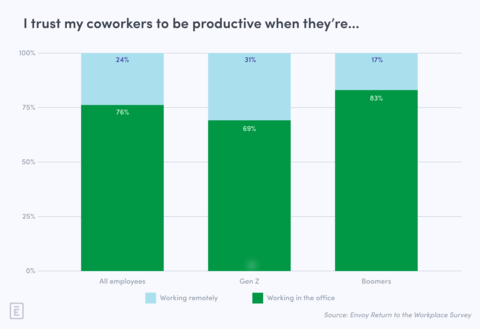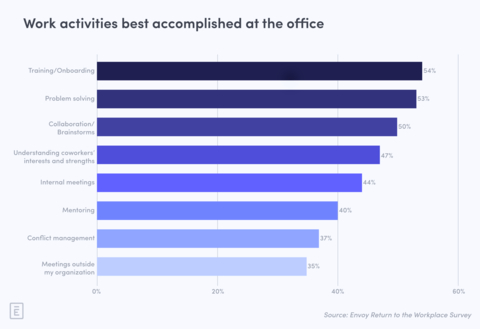SAN FRANCISCO--(BUSINESS WIRE)--Productivity paranoia. Proximity bias. Quiet quitting. Workplace culture is shifting faster than ever, which has left employees and workplaces adjusting to a lot of change in a short amount of time.
Today, Envoy released its latest Return to the Workplace survey which explores these culture shifts and issues of workplace trust, productivity, job security, and the value of work friendships.
Despite an increase in productivity paranoia and employee monitoring, an astonishing 94% of workers believe their managers trust them to do their work from anywhere, home or the office. The older the worker, the greater the confidence. Only 57% of Gen Z feel strongly that they have their manager’s trust compared with 71% of Millennials and 77%* of Boomers.
Though most employees surveyed believe their managers have faith in them, 44% have experienced an uptick in micromanaging since returning to the workplace. 38% claim the micromanagement is the same whether in-office or remote and 18% say the controlling behavior has lessened since their return.
“Workplace culture has taken a beating over the past few years. Less visibility in the office is skewing perceptions and seeding a distrust of everyone and everything, starting from leadership and trickling down,” said Larry Gadea, CEO and Founder of Envoy. “There was a time when managers didn't care how work was accomplished. Now they realize that the relationships and trust employees develop in-person are critical to getting work done right, especially in today’s environment. The companies that understand this are bringing teams together on-site – in some capacity– to work towards hitting those hard-to-reach company objectives. By being physically present, teams can adapt and solve complex problems faster and more efficiently than in isolation.”
Here’s what is motivating, inspiring, and worrying those who’ve returned to the workplace:
Employees trust coworkers who show up to the office.
- We asked employees who they trusted more to get their work done, those in-office or those working from home. 76% of employees trust coworkers to be productive when they’re in the office. Meanwhile only 24% trust their coworkers to get work done remotely.
- Productivity paranoia may be a factor. Leaders are worried about how much work is actually getting done, and employees might be mirroring their distrust.
- Gen Z employees, more than any other generation, give remote coworkers the benefit of doubt. 31% trust their colleagues to do their work when working outside of the office. Only 23% of Millennials, 26% of Gen X, and 17%* of Boomers feel the same.
- Those that split their time between the workplace and home tend to put more faith in coworkers who work remotely. 34% of hybrid employees put more trust in colleagues to get work done remotely compared to only 10% of those who work full-time in the office.
Yes, there are tasks best accomplished in the office.
- Almost every employee (98%) believes certain work activities can be better achieved at the office versus remotely. Topping the list are training and onboarding (54%), problem solving (53%), and collaboration or brainstorm sessions (50%). At the bottom of the list are conflict management (37%) and meetings with folks outside the organization (35%).
Employees agree that office visibility improves job security given recession fears.
- Envoy’s At Work report last fall found that 96% of leaders notice employees' work contributions more when employees come into the office versus when they work from home.
- As economic pressures and layoffs continue, most workers see office visibility as a critical advantage. In this latest survey, 92% say being seen at the office improves their job security, even if only slightly. Nearly 2 in 5 (38%) believe it significantly boosts their ability to keep their position.
- When asked what changes would help their company succeed during a potential recession, 56% of workers point to improving operational efficiencies. 53% say that giving people more flexibility will make the difference while 44% believe a greater focus on company culture or strengths will help their company survive.
- Only 40% mentioned layoffs, executive pay cuts, or other cost cutting measures.
Teamwork matters more than individual performance.
- How well people collaborate with others and how much work they’re able to accomplish as a team is more important than ever. More than half of office workers (54%) say their managers value group productivity over individual performance.
- Men (58%) and those in Gen Z (59%) are more apt to believe that managers prioritize group productivity over individual performance. Only 49% of their female counterparts and 53%* of their Millennial peers think likewise.
Why do people make friends at work? To build a network of support.
- Without trustworthy friends, an office can be a lonely place. 69% of those surveyed say that they make friends at work for support. 68% prioritize work relationships for better collaboration, while 60% say friendships give them a deeper sense of belonging.
- Overall, the return to the office has employees feeling better about themselves and their coworkers. 85% report a stronger sense of camaraderie since their return, which has boosted their mental wellbeing.
Gadea added: “This year, some companies will shine and stand out from the pack. Not because they build the best widget or have the hardest working employees, but because of intentional steps they’ve taken to rebuild a strong community together.”
Envoy’s Return to the Workplace report is a data-driven workplace survey that features the latest employee perspectives on the workplace. For more trends, read the companion blog.
*Small base size: findings are directional.
About This Survey
Envoy partnered with Wakefield Research to survey 1,000 U.S. office workers working in a physical workplace at least one day per week. “Office workers” are defined as those employed full-time, excluding those with a seniority of director or greater. “Returned" is defined as those working from the office at least 1 day per week, and who have returned to the office sometime in the past 24 months, but not within the last 30 days. Survey responses were collected between December 12th and December 21st, 2022, using an email invitation and online survey.
Data has been weighted to ensure an accurate representation of U.S. office workers who have returned to the workplace. The overall margin of error for the findings is ±3.1 percentage points at a 95% confidence level.
About Envoy
Envoy is transforming modern workplaces for flexible work to bring people together so they can connect, collaborate, and thrive. Envoy’s workplace platform has redefined how companies welcome visitors, improve the employee experience, book desks and conference rooms, and manage workplace analytics in 16,000 locations around the globe by designing products for a flexible workplace experience. Companies like Slack, Pinterest, and Warby Parker rely on Envoy to create an unrivaled first impression and keep their offices secure and compliant.
For more information, please visit envoy.com.






